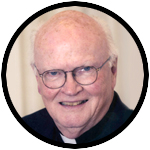
Father William Byron, S.J.
George Washington’s Farewell Address is read annually in the Senate sometime during the month of February. The tradition began in 1862 as a way to boost morale during the Civil War, was recalled in 1888 for the centennial of the Constitution’s ratification, and became an annual event after a few years.
The practice stresses Washington’s commitment to national unity, friendship in international affairs and providing a place for religion and morality in national life.
Although it is not a breezy read, a review of the Farewell Address might serve to impress upon our 45th president the threefold commitment — unity, friendship, religion — that our first president saw as essential to presidential leadership and the security of our nation.
Addressing his remarks to “friends and fellow citizens,” President Washington expressed the hope that “your union and brotherly affection may be perpetual” and that “the free Constitution, which is the work of your hands, may be sacredly maintained.”
[hotblock]
He added the hope that the administration of the Constitution “in every department may be stamped with wisdom and virtue.”
There is little evidence that the Donald Trump White House has provided space for wisdom, virtue and brotherly affection.
Even if it can be assumed that reverence and respect for the Constitution hold pride of place at 1600 Pennsylvania Ave., it is questionable that what the Farewell Address called “unity of government” will constitute us as “one people” and remain “dear” to us during the Trump administration.
We risk losing a lot if President Trump pays no attention to President Washington.
In George Washington’s view, “unity of government” is a “main pillar in the edifice of your real independence, the support of your tranquility at home, your peace abroad; of your safety; of your prosperity; of that very liberty which you so highly prize.”
“It is of infinite moment that you should properly estimate the immense value of your national union to your collective and individual happiness,” said Washington.
I don’t think we should leave it to Kellyanne Conway and Steve Bannon to keep President Trump apprised of the measure of our national unity today.
Nor can we look to others now in the administration to wrap public policy, especially foreign policy, with “affection.” Washington believed that affection had a role to play in government, and President Trump has to avoid the temptation to “talk tough” and think that he has to walk over others to move this nation forward.
Let President Trump choose President Washington as his tutor. And let him turn to the Constitution of the United States and Washington’s Farewell Address as textbooks that can help him shape a style of presidential leadership.
He will learn something new every time he reads these documents; he will avoid major mistakes if he reads these documents carefully.
***
Jesuit Father William J. Byron is professor of business and society at St. Joseph’s University, Philadelphia. Email: wbyron@sju.edu.
PREVIOUS: The ‘whole life’ approach to pro-life advocacy
NEXT: How a refugee family became ‘our family’



Spoken like a true democrat and Jesuit.